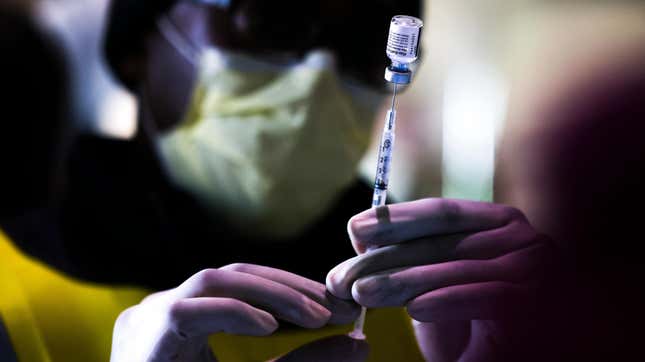
On Monday morning, pharmaceutical companies Pfizer and BioNTech announced the results of a clinical trial testing out their covid-19 vaccine in children between the ages of 5 and 11. They claim to have found that the vaccine was safe and generated a robust immune response in participants, hopefully signaling its effectiveness. The findings have yet to be made available to the public, but the companies plan to submit the data soon to regulators in the U.S. and elsewhere to secure the vaccine’s authorization for children in this age group.
Pfizer/BioNTech’s vaccine was the first to win emergency authorization in the U.S. last winter, and it has since become the first to be fully approved by the Food and Drug Administration for all Americans over 16. Earlier this year, the vaccine was also authorized for children between 12 and 16, and Pfizer has stated that it would seek authorization for younger children before the end of 2021.
Other countries, including Cuba and Cambodia, have recently authorized or approved the use of covid-19 vaccines for children as young as 2 years old, even as the World Health Organization has advised countries to hold off for the time being. The WHO and others (including the FDA) have noted that the data simply isn’t there yet to guarantee vaccine safety for children under 12, but these countries have argued that the risks of allowing children to keep contracting covid-19 will outweigh any potential risks of vaccination. Pfizer’s new findings are especially important, then, since theirs is the first pivotal trial data of a vaccine to be presented for children between 5 and 11.
The Phase 2/3 trial involved over 2,200 children between those ages in the United States, Finland, Poland, and Spain who received a low-dose version of the two-shot vaccine or placebo. The dosage was one-third of what’s given to adults. In these children, the vaccine was found to be safe, the company said. There were no reported cases of myocarditis, for instance, a potential rare risk seen more commonly in younger men and male teens who have taken an mRNA vaccine, the company told CNN. Additionally, participants were said to have neutralizing antibody levels similar to those seen in vaccinated people between the ages of 16 and 25, indicating that the vaccine should be similarly effective at providing protection against illness and death for these children.
“These trial results provide a strong foundation for seeking authorization of our vaccine for children 5 to 11 years old, and we plan to submit them to the FDA and other regulators with urgency,” Albert Bourla, Pfizer CEO and chairman, said in a statement.
It’s important to note that these results have yet to be vetted by outside scientists, a crucial step for evaluating any scientific research. And some experts have already brought up some questions yet to be answered. For instance, Pfizer conducted a smaller Phase I trial for children these ages testing out three dosages, before they settled on using the current one, the lowest dosage evaluated (an even smaller dosage is being used in their trials for children under 5). So it’s worth wondering if there were any signs of reduced safety in the higher-dose groups. Another question is whether the antibody levels measured in this trial are truly an accurate proxy of the vaccine’s real-world effectiveness against covid-19 among these children.
Some of these concerns will only be addressed with time, if and once the vaccine is authorized for children in this age group, while others may be answered once the clinical trial data is made available to regulators and by extension to the public. But for now, things are looking positive. Reuters reported earlier this month that vaccines for children 5 to 11 could be authorized as early as next month. Meanwhile, Pfizer has said that it plans to present data on their trials of children 2 to 6 years old and 6 months to 2 years by the end of 2021.